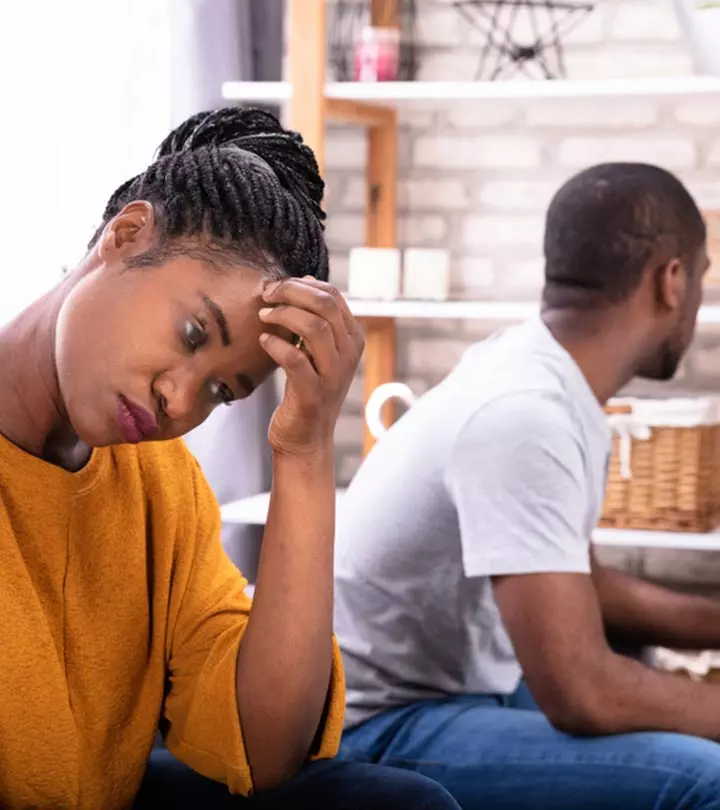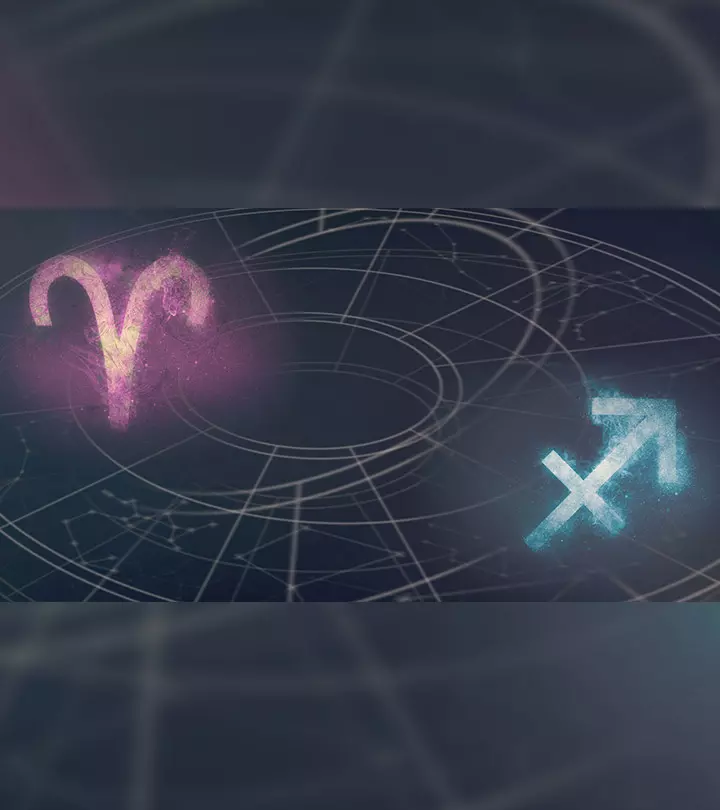One-Sided Relationship: 15 Signs To Spot And Solve It
Look out for these red flags and avoid getting caught in an unhealthy and unhappy relationship.

Image: Shutterstock
One-sided relationships are unhealthy as only one partner is invested in the relationship. The relationship could be toxic and cause both parties to suffer heartbreak. One of you may feel the other is controlling everything, while the other may feel the first one is disinterested in the relationship. It can cause discord and imbalance between the couple and adversely affect their psychological and physical well-being. How can you tell whether you are in a one-sided relationship? What can you do to spare yourself from all this emotional distress? This article will help you figure it all out. You will also learn everything about unequal or one-sided relationships, the causes, signs, and solutions that can help. Take a look.
In This Article
What Is A One-Sided Relationship?
A relationship is one-sided when one of the partners is putting significantly more effort into the relationship than the other one. There is minimal reciprocation from one side, which leads the invested side to be hopeful while the other has no intention to work harder in the relationship. It is an endless loop of a non-committal presence and disappointment. It is not a healthy relationship. It may leave one with heartbreak, self-doubt, and insecurity. As a wise person once said, relationships are worth fighting for, but you can’t be the only one fighting.
What Causes A One-Sided Relationship?
One-sided relationships can have a number of causes. Differences in communication styles between partners, family histories, distress due to past relationships, or even incompatibilities between partners can cause lopsided relationships.
The first step to fixing a one-sided relationship is knowing that you are in one. The following signs can help.
15 Signs Of A One-Sided Relationship
1. You feel like you are always there for them, but they are never there for you
Parties, celebrations, or any event from your partner’s connections – you are always there. But you always find your partner absent when it is your turn. Apart from social situations, you also are there for your partner irrespective of the circumstances and situations. But you don’t see the same from the other end. They don’t seem to care.
2. You’re the only one who invests time and effort in the relationship
You give your time, emotions, energy, and other resources to the relationship. But the other person does not spend enough time to cater to your interests or feelings. They don’t seem to be interested in improving the unequal partnership in any way.
Robert Ralph, a blogger, shared his experience with a one-sided relationship. In his blog, he wrote, “I got frustrated trying to understand why “I had to make all the effort” and got nothing back in return, even with simple things like cuddling my partner and realising that she wanted to pull away (i).”
3. You don’t feel secure and have started doubting yourself
You start to wonder if it was all your fault. You wonder if you should have done something (or shouldn’t have done something). Such thoughts have become a common occurrence for you. You have also started to second guess your actions as you never feel secure in the relationship.
Marriage and Family Therapist, Nathalie Maggio says, “In a one-sided relationship the partner who is more invested in the relationship often finds themselves questioning their worth and feeling like they are not enough. They may end up questioning if their partner would be more invested if they were less imperfect or start to believe that they are just too needy.”
4. You have started to give excuses for them to people around you
You want to introduce your partner to the people close to you. But they don’t show up, and you start giving excuses for them. While such excuses for their behavior are leverage to your partner, they don’t even seem to acknowledge your efforts.
5. When you think about it, you only experience more negative feelings than pleasant emotions
Look back at your relationship and count the number of times you felt distressed and emotionally exhausted versus the number of times you felt happy, loved, and satisfied. This act of introspection can tell volumes about your relationship.
6. You feel like it’s your fault even if it isn’t
You have started to blame yourself and find faults within yourself. They also tend to blame you while, in reality, it is not your fault.
7. You are too cautious while talking to them
You start your conversations keeping their temper in mind. You are extremely cautious not to say the wrong thing.
Maggio shares her observations, “A common sign of an unhealthy relationship is when at least one partner is walking on eggshells in order to keep the peace. We may find ourselves engaging in such behavior when the other partner is already putting in little to no effort, in order to prevent them from withdrawing even more.”
8. You are never able to predict their mood
You never know what to say or do. You may think they want something, but they’ll only prove you wrong. You may think they’re in the mood to joke and laugh, but you will only discover that they want to instead sit alone and lament.
9. You are the one who always mentions the problems in the relationship
You are the one trying to untie the infinite amounts of knots in the relationship, each and every time.
And as you seem to untie one, a few more appear, and you end up even more tangled up than before. But your partner has no interest in helping you out.
“Speaking about problems in our relationship often brings up distress and may therefore seem counterproductive. However, being able to have a safe space and open dialogue around what is bothering us in a relationship is a key factor in a healthy relationship as it helps partners get to know each other better and prevents the buildup of resentment,” Maggio opines.
10. You discuss problems with others rather than with your partner
You would rather sit with a family member or friend than with your partner to discuss how to solve your relationship issues. Because you know that discussing such issues with your partner gets you nowhere.
11. Establishing boundaries sets them off
Boundaries in any relationship are important. They ensure that the relationship is mutually respectful and healthy. But your partner has started breaking them or is throwing tantrums when boundaries are established. You don’t feel quite respected in the relationship.
12. You cannot agree with each other when it comes to important things
You both are at each other’s throats when important decisions are to be made. Neither of you are ready to back off, nor do you show any signs of trying to understand the other.
 Quick Tip
Quick Tip13. You think you have the power to change or control them
You think you can get them to change. You think you can just force them to be in a manner that you like. You constantly are making attempts to change them. But they seem to only ignore you.
14. Your relationship is either hidden or sugar-coated from your loved ones
You have started to talk about your relationship with your friends and family. You have started to over-sell it as the most perfect relationship in existence. You aren’t honest about your relationship.
15. The relationship has reached a stalemate
The relationship seems to be going nowhere. Neither you nor your partner feels happy with each other. While you may want to try to keep your partner happy, they don’t seem to reciprocate. Unreciprocated affection starts affecting the relationship you have with yourself as you begin to question your self worth and if you deserve to be loved.
These are the signs of a one-sided relationship. Yes, such a relationship is hurtful and can even turn toxic. But fret not – as there are ways to fix it.
How To Fix A One-Sided Relationship
While it may seem hopeless, that’s not always the case. You can fix a one-sided relationship, though that requires a lot of effort from both sides.
1. Face reality and ask the right questions.
First and foremost, accept the reality and face it head-on. There’s no point denying the problem when it seems tempting to just assume that it doesn’t exist. Accept that there is an issue and decide to acknowledge it.
Maggio advises, “If communication has been difficult in the past I recommend finding a time and place which is conducive to having a challenging conversation. This can include picking a private location in which you won’t be interrupted, a time which works for both partners, avoiding late nights talks as well as influences from substances that alter our judgment including alcohol and drugs.”
2. Find out what your deal breakers are through a relationship efficacy scale.
Find an inventory/scale that measures relationship efficacy (one that is legit) and look at the problems that could be arising from your side. If possible, get your partner to try it out as well.
“I recommend the “Gottman Assessment” which is based on 40+ years of scientific research,” suggests Nathalie Maggio.
3. Take time to sit and discuss the issues, and be open while discussing.
Take time and sit down to discuss the issues you both are facing. Be open and lay all the cards on the table. Don’t hide anything. It’s your relationship and your life, and you must take it by the reins.
4. Understand that communication is key
This point cannot be stressed enough. Communication is the key that would unlock the answers to your issues. Open communication alone can change your circumstances in a manner that benefits both of you.
Ways To Deal With A One-Sided Relationship
Nobody wants to be in a one-way street. But you just happen to be on the wrong side of the fence at times. What do you do then? How do you deal with one-sided affection?
1. Do some introspection
Sit down by yourself and do some soul-searching. You’ll most probably find an answer within yourself. Maggio adds, “I recommend reflecting on what your core needs are in a relationship and which of those needs are not met currently.”
2. Identify the issue
Realize what the problem is. Make sure you know the exact issue and spell it out to your partner.
3. Create a relationship journal by keeping track of your interactions.
Start a diary. Maintain a daily record of your relationship. This will show you the flow of your relationship.
4. Do not arrive at any conclusion through text messages
Never use text messages as a way to decide what happens with your relationship.
5. Understand that your partner can get defensive when you express your discontent
Understand that your partner can get defensive and even shut off when you start to discuss the issues with them. But keep at it. Be calm, but firm. Slowly, but surely, you’re bound to make sense to them.
Nathalie Maggio suggests, “If you know that you struggle with communication and getting your point across, then writing down what you want to express can be really helpful. You can then tweak your language until you are satisfied with how it sounds.”
6. Determine whether your partner is willing to change
You must speak out when their behavior is hurting you or them. You must understand whether they are ready to change. If they are, then it is obvious that they definitely value your opinion. If not, well, that is a sign.
7. Concentrate on a single issue at a time
Don’t rant off about all the issues in your relationship. Take it one step at a time.
8. Regain your concept of self
Get your joy and your sense of self-worth back when it’s not your fault.
 Quick Tip
Quick Tip9. Decide on a course of action
Decide on where to go and what to do next. Make a plan and stick to it.
10. Seek assistance
Seek help when you think you don’t know what to do next. Reach out to your friends, family, or a professional helper.
11. Practice forgiveness and letting go
Forgiveness is a gift you give to both yourself and your partner. Learn to forgive and let go of the past to make way for the present.
Red Flags To Watch Out For
Here are the most common red flags to look out for. Keep an eye out for them and take measures right at the beginning.
- You’re the only one trying to keep the relationship going.
- Your partner’s priorities are way different from yours.
- You’re stuck making excuses for them all the time.
- Your partner seems to solely control the relationship.
While it is possible to fix a one-sided relationship or a situation of unrequited affection, you also must know when to end it.
When To End A One-Sided Relationship
It is time to end a one-sided relationship when you’re the only one putting in the effort and doing all the emotional, mental, and physical work to make the relationship work. You know you are only exhausting your resources into fixing the relationship, but to no avail. This is a relationship filled with unrequited desire and love that is doomed until your partner chips in. A bridge is built from both sides, and you can’t be the only one building it forever.
One-sided relationships are unhealthy where only one person always tries to put their time and effort into making it work. Poor communication, distress due to past relationships, and incompatibilities between partners are the common cause of a one-sided relationship or unrequited love. However, not everyone’s relationship is unbalanced or one-sided. If yours is one such, try to communicate more often with your loved one. In addition, try to fix this one-sided love and unrequited feelings by finding out the deal-breakers, asking the right questions, or seeking help from a professional.
Frequently Asked Questions
Are one-sided soulmates a thing?
No. When two minds meet on the highest spiritual level, they become soulmates. Therefore, the idea of one-sided soulmates is illogical.
What is the difference between a crush and one-sided love?
When you have a crush on someone, they may or may reciprocate your feelings. Moreover, your feelings about your crush could be momentary or profound. On the other hand, one-sided love is unrequited. The sentiments in unrequited passion or unreturned love are deep and may last for a long time or even forever, but they are never reciprocated.
Can a relationship work if it’s one-sided?
One-sidedness does not last for very long unless there is some pressure on the couple to stay together. However, one-sidedness can work and be fixed if both people come forward with the intent to resolve the conflict and address each other’s emotional needs.
Can one-sided love be true love?
One-sided love can be painfully intense and feel like true love, as our perception of true love is based on the idea of unconditional giving without seeking. It may happen that your love is true and your intentions are pure, but this does not mean it is the only kind of love meant for you.
Should I break up from a one-sided relationship?
Breaking up from a one-sided relationship is probably the best idea as it will save you from a lot of conflict, emotional distress, and false hope.
What kind of support do I need to get out of a one-sided relationship?
Talking and putting forth your views about your relationship will help you a lot. As one-sided relationships lack a healthy connection and communication, talking will help you cope with your unresolved issues and get out of it.
What are some ways to rebuild my self-esteem after a one-sided relationship?
The first step is acceptance of the behavior. You may be filled with anger, doubt, and hatred towards yourself and the other person for the way you were treated. Accept that you can not change everything and you functioned based on whatever understanding you had about relationships. Learn your lesson and end the relationship kindly and move forward with better clarity of what you actually want from a real relationship.
What are some strategies for communicating my needs in a relationship?
Be kind and approachable. Explain about the things that bother you and how they affect this relationship. Tell them about what you want and how the lack of it is affecting your relationship. When they speak, focus on understanding their perspective too. And most importantly, do not manipulate feelings in order to have your needs met or you will miss the opportunity of having honest communication.
Key Takeaways
- A one-sided relationship is a relationship where only one person in the relationship tries to make it work.
- It is an unhealthy relationship that will leave you with heartbreak or insecurity.
- If you feel insecure around your partner, and you are always there for them but they are never there for you, they are signs of a one-sided relationship.
- Taking time out for yourself and having an honest conversation with your partner about where the relationship is headed and what needs of yours are not being met, are some ways to deal with this issue.
Do you feel like you’re always giving more than you’re getting? Check out this video for the signs of a one-sided relationship. Learn how to recognize the signs and take action.
Personal Experience: Source
StyleCraze's articles are interwoven with authentic personal narratives that provide depth and resonance to our content. Below are the sources of the personal accounts referenced in this article.
i. Why Stay in a One-Sided Relationship?https://medium.com/@robertralph/why-stay-in-a-one-sided-relationship-112745d93a9f
Read full bio of Nathalie Maggio
Read full bio of Sneha Tete
Read full bio of Asmita De
Read full bio of Gazala Firdos Ansari

































Community Experiences
Join the conversation and become a part of our empowering community! Share your stories, experiences, and insights to connect with other beauty, lifestyle, and health enthusiasts.